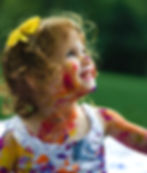6 Important Life Lessons We Can Learn From Children
- Brainz Magazine
- Apr 15, 2022
- 6 min read
Updated: Apr 16, 2022
Written by: Flora Bami, Executive Contributor
Executive Contributors at Brainz Magazine are handpicked and invited to contribute because of their knowledge and valuable insight within their area of expertise.

“We spend our whole childhood wanting to grow up faster. But we spend our whole adult life, wanting to go back to the simplicity of being a kid again”.
This quote made me reflect on how our life would be if we were connected with our childish nature.
Children are such wonderful teachers. If we want to remember ourselves, and what life is all about, we just need to observe a child for a few minutes.

The artistic impulse is strong in the early years of life, same as the notion of freedom and kids’ genuine curiosity and interest to explore the world, nature, every little piece of land, plant, little bug, and a beautiful butterfly. Kids are spontaneous, very connected with their bodies and emotions, expressing them without thinking if this is the right time to cry or laugh. Kids keep asking questions and challenging everything. Kids can teach us so much about living life, having hope, and making the most out of any situation. We could actually unlearn and relearn many things from them.
Here I am sharing 6 key qualities we can learn from children to be happier adults.
1. Be curious and excited
One of the major lessons that we can learn from a child is being repeatedly amazed at the beauty and joy of life. Children are endlessly curious. When we lose our sense of curiosity, it’s almost like we die a little inside. Curiosity leads us towards self-fulfillment. Ask questions in your daily life at work, with friends, with business partners, wherever you can with the intention to learn something new.
Asking questions shows humility and a desire to learn. Be curious. Keep your mind active instead of passive. Start from a place of not knowing. Keep an open mind and an attitude of wanting to learn instead of judging. And also, connect to the fun in learning. Ask questions. Question everything.
Living our life from a space of curiosity makes us more excited and full of enthusiasm and energy to learn, discover, and explore. Never stop getting excited like a child for a new job, a new friendship, our achievements, or the little things that happen every day. Excitement, along with motivation, is the driving force behind achieving our dreams.
2. Be fearless
Don’t be afraid of new things and falling. Sometimes a little bit of risk is necessary to keep going forward. Have you ever seen a child fall without getting up? Life works the same way. It’s usually our minds that limit us. Fall down so you can get up again. It will be okay. But shifting the perspective and seeing every little mistake as a learning opportunity and taking it lighter, helps to get over it and move on. Children jump, climb, fall and get right back up. As a kid, it’s almost expected rather than feared. What would happen, though, if you tapped into those younger days when caution wasn’t relevant—the sparkling goal was much greater than the potential cost of reaching it? What if we simply jumped into anything with the confidence of a child learning something new? Putting fear into perspective may just allow for more self-discovery and adult exhilaration.
3. Be in the present moment
One of the beautiful elements of the child is that the child is immersed in the present moment. As a result, children experience the full impact of life itself. The full taste and smell and feel and sound of things. They see and experience everything for the first time and don't necessarily rely on habitual actions to experience the situation. Children just learn by living in the moment and truly 'feeling' it.
Strange as it may seem, it is harder to not be in the present moment than it is to be in the present moment. We can learn from them how to bring our attention back to what is happening at the moment regarding whatever it is that we are experiencing. And take it in fully. Really be there. Kids practice mindfulness, not only when they are creative but throughout their way of being. This mindful concentration results in an enjoyable psychological state of focused attention, they are in the zone, in the flow wholeheartedly. It is only the heart that lives in the present moment; not the mind.
4. Feel your feelings
When kids are happy, they smile and laugh. When they’re sad, they cry. Children are not afraid to let their feelings be shown. When an emotion arises, they let it out. They scream loudly. They laugh unabashedly. They cry with deep tearful rivers flowing down their cheeks. What emerges from within at any moment is seen and heard. There is no mistake about how the child feels. Moreover, when they express one emotion, after a few moments they are on the next. They can be happy, sad, and angry within a span of a few minutes. As an adult, you may attempt to control your emotions without acknowledging how you feel. You may adopt compulsive behaviors around stuffing your emotions, denying them, suppressing your feelings, and forcing them into something you think is more acceptable to the world and to others. Giving permission to ourselves to feel what we feel without suppressing it, eating it, or hiding it, is the only healthy way to express and release our emotions. It's a form of self-compassion and self-acceptance.
5. Have fun and play
Children enjoy themselves, laugh, and have fun because they’re not watching out for what people will say about them. They live in the moment, enjoy the little things, and smile to welcome a new day.
This helps to take things, people and life overall lighter. Children simply play. When we are children, we know how to have fun. Play is just a natural, intrinsic function of being human. Play is defined as an engagement in an activity for enjoyment and recreation rather than for a serious or practical purpose. But this is where we have to stop and think. We have all grown up thinking that play is not synonymous with any purpose. We grow up and wonder why we aren’t happy without realizing that it is because we don’t take the straight path to happiness by prioritizing enjoyment, fun, and play.
When kids play, they think, connect and create. As Albert Einstein once said, “To stimulate creativity, one must develop the childlike inclination for play.”
6. Be Creative
“Every child is an Artist. The problem is how to remain an artist once he or she grows up”, Picasso said. What happens to our creative side while growing up? Creativity is an innate quality that everyone possesses so it can never be truly lost. To unleash your creativity, simply watch how a child creates. By watching how they create, you might then get messy. You might assume you’d be good at something and find out whether you are or not by trying it. You might let your imagination run free, uninhibited by ideas of what is possible and not possible. You might stop being inhibited by what other people will think of what you create. Kids do not follow any rules or standards or try to meet others’ expectations while they create. They simply play with colors, rely on their imagination and free spirit, they love experimenting, they play, try new things, make mistakes, daydream, and look at the clouds. Kids are masters of making their own rules, exploring new ideas, and most of all — playing.
Children in their innocence and purity are powerful mirrors that show us what is innately within, and what we long to reconnect to, a presence that has never left us. We can take the role of a kid or reconnect with our inner child and experiment with things, unleash our creative side, approach life and people with curiosity and authentic interest and start to look at the world and the immediate environment in a fresh and entirely different way.
Childlike wonder still lives inside us — no matter our age. It’s just a matter of embracing it. Only when we rebuild our relationship with our inner child, do we open the door to deep healing and true happiness. Let children show us the way.
Flora Bami
ICF Integral Coach Holistic Wellbeing Strategist / Diversity & Inclusion Expert

Flora Bami, Executive Contributor Brainz Magazine
Flora Bami is an optimist, an experienced and passionate integral coach, with expertise in life, mindset, relationships, and wellbeing coaching. Her main focus is on making your relationship with yourself healthier and reframing your inner voice based on self-love, acceptance, and compassion.
Her mission in life is to support people in their life journey to reach their potential and feel better and happier, through individual coaching and setting up wellbeing programs in big organizations.
Better people, better world!
Happier people, happier world!
After going through a deep transformation herself and turning trauma into a gift, she dedicated her life to supporting people reconnecting with their true selves.


.jpg)






